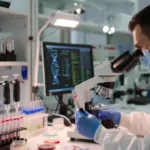Key Points:
- Scientists unveil revolutionary advances in anti-aging technology targeting cellular mechanisms of aging.
- CRISPR technology enables precise gene editing to reverse age-related changes and restore youthful characteristics.
- Stem cell therapies rejuvenate aging tissues and organs, offering potential solutions for age-related degeneration.
- Personalized medicine tailors anti-aging interventions to individual genetic profiles and lifestyle factors, maximizing effectiveness.
In a groundbreaking leap forward, scientists have unveiled cutting-edge advancements in anti-aging technology, offering hope for a future where aging may no longer be an inevitable aspect of human existence. Through pioneering research and innovative discoveries, the boundaries of what was once deemed possible in aging are shattering, ushering in a new era of rejuvenation and vitality.
At the forefront of this transformative technology is the development of novel treatments that target the underlying mechanisms of aging at the cellular level. Scientists have identified key pathways and biological processes contributing to age-related decline, paving the way for interventions that can reverse or slow the aging process.
One of the most promising approaches involves gene editing techniques to repair damaged DNA and restore cellular function. By harnessing the power of CRISPR technology, researchers can precisely edit genes associated with aging, effectively reversing age-related changes and restoring youthful characteristics to cells.
In addition to genetic interventions, scientists have made significant strides in regenerative medicine, leveraging stem cell therapies to rejuvenate aging tissues and organs. Stem cells can differentiate into various cell types, making them ideal candidates for repairing and replacing damaged tissues caused by aging.
Furthermore, advancements in personalized medicine have enabled researchers to tailor anti-aging interventions to individual genetic profiles and lifestyle factors, maximizing effectiveness and minimizing potential side effects. Comprehensive genetic testing and analysis allow the development of personalized treatment plans to address each patient’s unique aging trajectory.
Moreover, integrating artificial intelligence (AI) and machine learning algorithms has revolutionized the discovery and development of anti-aging therapies. By analyzing vast amounts of biological data, AI-powered systems can identify novel drug targets, predict treatment outcomes, and optimize treatment regimens with unprecedented accuracy and efficiency.
As these groundbreaking technologies evolve, the prospect of extending the human lifespan and enhancing the quality of life in old age becomes increasingly within reach. From rejuvenating aging cells to repairing damaged tissues, the future of anti-aging technology holds immense promise for unlocking the secrets of longevity and vitality.





